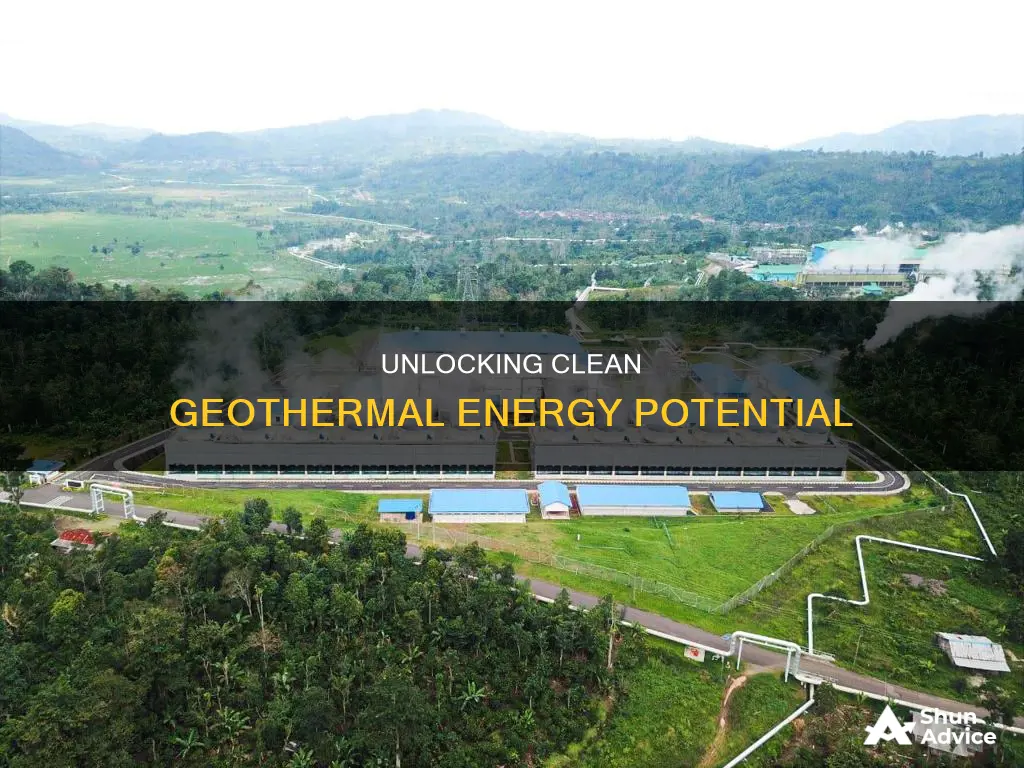
Geothermal energy is an increasingly popular source of energy that offers a multitude of benefits for investors, governments, and the environment. As a renewable and sustainable energy source, geothermal has the potential to play a crucial role in the transition from fossil fuels to cleaner alternatives. With a relatively small amount of space required for power plants, geothermal energy can help preserve natural habitats and reduce energy production costs. Additionally, geothermal energy is reliable, constant, and available all year round, making it a viable alternative to traditional energy sources.
From an environmental perspective, geothermal energy is advantageous because it does not require the burning of fossil fuels, resulting in significantly lower emissions of harmful gases. Geothermal heat pump systems are also highly efficient, using 25-50% less electricity than conventional heating or cooling systems. With the support of governments through subsidies and investments, the development and expansion of geothermal energy become even more attractive.
However, it is important to acknowledge that there are some challenges and risks associated with geothermal energy. The initial costs of installing geothermal technology are high, and there is a possibility that other renewable sources may outpace its development. Nonetheless, with growing awareness and advancements in technology, geothermal energy presents a promising opportunity for investors and a positive step towards a greener future.
| Characteristics | Values |
|---|---|
| Good for the environment | Geothermal energy is clean and can be extracted without burning fossil fuels. |
| Reliable source of renewable energy | Geothermal energy is independent of wind and sun and is available all year long. |
| High efficiency | Geothermal heat pump systems use 25-50% less electricity than conventional systems. |
| Low maintenance | Geothermal systems have long lifespans due to few movable parts. |
| Positive environmental impact | Geothermal energy can accelerate the transition from fossil fuels to renewable energy sources. |
| Sustainable | Geothermal energy is renewable and will be available for billions of years. |
| Space-efficient | Geothermal power plants require less space than solar or wind parks. |
| Competitive advantage | Government subsidies and lower energy production costs make geothermal energy attractive to investors. |
| Good return prospects | Investments in geothermal energy companies may lead to huge financial returns in the long run. |
What You'll Learn

Geothermal energy is renewable and sustainable
Geothermal energy is also known as a renewable resource because it is heat that flows continuously from the Earth's interior to the surface, and this process has been ongoing for about 4.5 billion years. The heat is continually replenished by the decay of naturally occurring radioactive elements beneath the Earth's subsurface, and it will remain available for billions of years to come. This ensures an essentially inexhaustible supply of energy.
The Earth's core contains a vast amount of thermal energy, and some of this energy is accessible near the crust. Geothermal energy can be found almost anywhere, from deep wells in Asia to hot springs in Iceland, or even in our own backyards.
Geothermal energy is extracted from the earth without burning fossil fuels, and geothermal fields produce minimal to zero emissions. This makes it an environmentally friendly alternative to conventional energy sources, as it helps to reduce greenhouse gas emissions.
While there are concerns about the possibility of depleting geothermal sources in specific locations, the overall supply of geothermal energy is considered sustainable and renewable on a global scale.
Investing: A Guide for Every Age
You may want to see also

It's a clean energy source
Geothermal energy is a clean energy source. Unlike fossil fuels, it does not require burning coal, gas, or oil, and therefore produces little to no emissions. Binary-cycle geothermal plants, for example, operate in a closed cycle and release zero emissions.
Using geothermal energy for electricity production results in only about one-sixth of the carbon dioxide emissions of a natural gas power plant, and little to no nitrous oxide or sulfur dioxide. This makes geothermal power plants a clean source of electricity and an important contributor to the goal of a zero-carbon future.
Additionally, geothermal energy has a positive impact on the environment. By using geothermal energy, we can accelerate the transition from fossil fuels to renewable energy sources, improving the quality of life for millions of people worldwide. Geothermal energy is also beneficial for the environment as it requires less land compared to solar or wind parks, preserving natural habitats and reducing costs.
Geothermal heat pump systems also use 25% to 50% less electricity than conventional heating or cooling systems, making them more energy-efficient. Furthermore, the Environmental Protection Agency has recognised geothermal heating as the most energy-efficient and environmentally safe heating and cooling system.
Overall, investing in geothermal energy is attractive as it is a clean, sustainable, and renewable energy source with a positive impact on the environment.
BlackRock: Investors' Choice
You may want to see also

Geothermal energy is reliable and constant
The constant temperature of the shallow Earth, usually between 40–70°F (4.5–21°C), provides heating and cooling solutions for buildings. Geothermal heat pumps use the ground as a heat sink in the summer and a heat source in the winter, increasing efficiency and reducing energy consumption for heating and cooling. This has led to a growing number of homeowners adopting geothermal heating and cooling systems.
The heat for geothermal energy is continuously replenished by the Earth's core and has been doing so for about 4.5 billion years. This natural process ensures an inexhaustible supply of energy for billions of years to come. The high-capacity factor of geothermal energy means that it can produce electricity 90% of the time or more, resulting in quick cost recoup due to very little downtime once a plant is operational.
Geothermal energy is also versatile. Geothermal power facilities produce useful by-product heat that can be integrated with greenhouses, fish farms, and food processing. Additionally, you can directly drill for heat. This versatility, along with its reliability and constant availability, makes geothermal energy a compelling option for investment.
The NFT Investment Craze: Why?
You may want to see also

Geothermal systems are highly efficient
The ground below the frost line maintains a consistent temperature of 55 to 65 degrees Fahrenheit all year long. This means that geothermal heat pumps can efficiently heat your home even in extremely cold weather. For every one unit of power, a geothermal heat pump absorbs three units of energy from the Earth, allowing it to produce four units of output heat. Geothermal heat pumps are 400% efficient, while the most efficient gas furnace on the market has an annual fuel utilization efficiency (AFUE) rating of 98%. This means a geothermal heat pump is 300% more efficient at heating your home than a gas furnace.
The energy efficiency of heat pumps is measured with the heating season performance factor (HSPF) rating. The most efficient air-source heat pumps have HSPF ratings of 10, while geothermal heat pumps have ratings of 13 or higher. Geothermal heat pumps are also more efficient for cooling, with a seasonal energy efficiency ratio (SEER) rating of 30, compared to 20 for the most efficient central air conditioning systems. With a geothermal heat pump, your home will use about 50% less energy for cooling in the summer compared to a central air conditioning system.
Geothermal heat pumps also have long lifespans, with underground parts typically lasting 50 years and above-ground parts lasting around 25 years.
Savings Woes: Firms' Investment Blues
You may want to see also

It's a positive environmental investment
Geothermal energy is a positive environmental investment for several reasons. Firstly, it is a renewable and sustainable energy source, with the heat inside the Earth's crust expected to last until the end of human history. This makes geothermal energy a promising alternative to fossil fuels, which are finite resources.
Secondly, geothermal energy is relatively green. While it is true that the construction of geothermal power plants requires non-renewable resources, the overall environmental impact is much lower than that of conventional energy sources. Geothermal energy production does not involve the burning of fossil fuels, and geothermal fields produce minimal emissions.
Thirdly, geothermal energy has a positive impact on the environment by reducing the use of more harmful energy sources. Geothermal power plants emit significantly less carbon dioxide and other pollutants than fossil fuel power plants of similar size. By investing in geothermal energy, we can accelerate the transition from fossil fuels to renewable energy sources, improving the quality of life for millions of people worldwide.
Additionally, geothermal power plants require relatively small amounts of land compared to solar or wind farms. This means that large areas of land can be preserved, protecting the habitats of various animal and plant species. Furthermore, the compact nature of geothermal facilities can also lower the cost of energy production, benefiting investors in the long run.
Lastly, the use of geothermal heat pumps can be an energy-efficient and environmentally safe option for heating and cooling buildings. These pumps use the constant temperature of the Earth to regulate heat, providing a reliable source of renewable energy that is independent of external factors such as wind and sun.
In conclusion, investing in geothermal energy is a positive environmental decision that can lead to significant returns, both financially and in terms of contributing to a more sustainable future.
ESG Investing: Who's On Board?
You may want to see also







